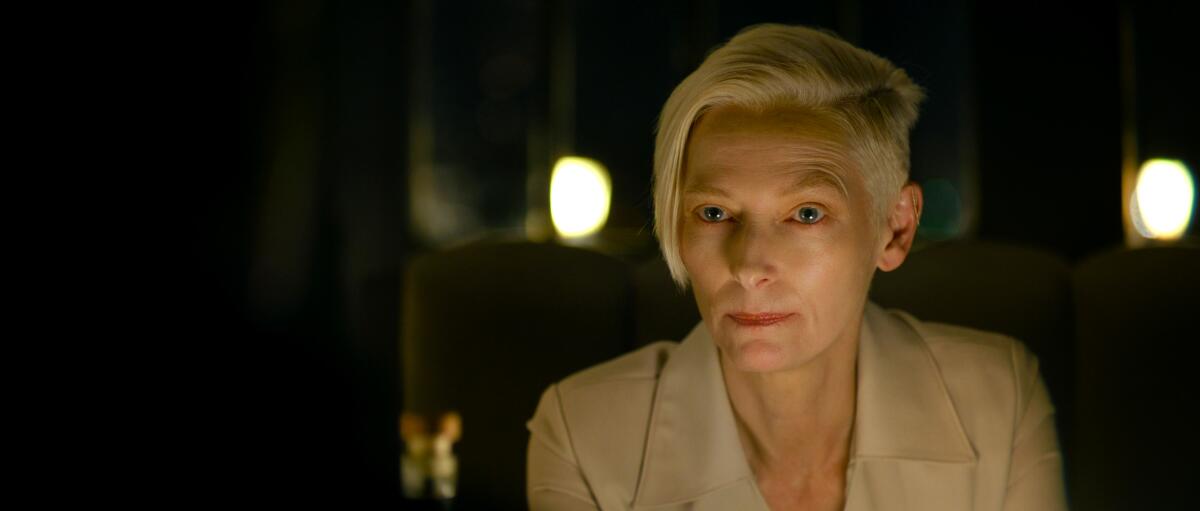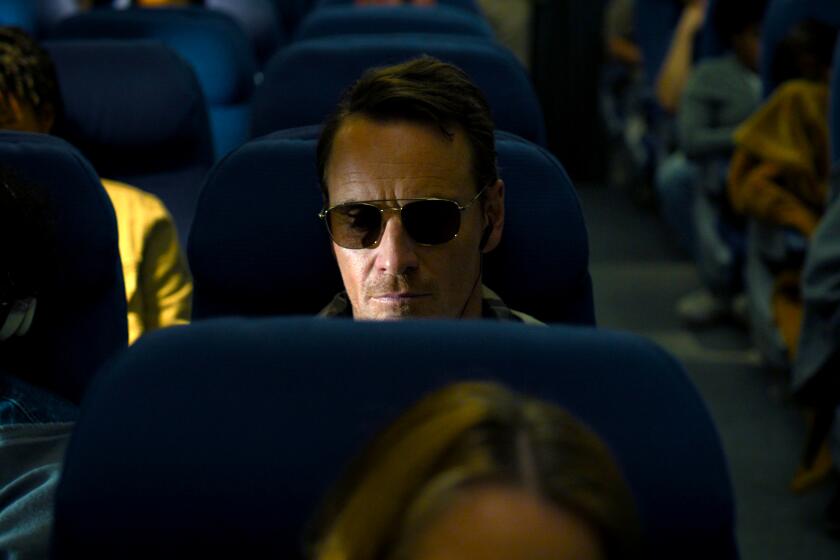How Andrew Kevin Walker created a chatty ‘Killer’ who breaks his own rules

Andrew Kevin Walker feels right at home on the patio of a Los Feliz restaurant. As he should; the Pennsylvania native has lived in the L.A. neighborhood since moving here from New York with his screenplay for “Se7en,” the disturbing thriller that became director David Fincher’s 1995 breakout feature.
Gregarious as the protagonist of “The Killer,” his new feature with Fincher, is taciturn — the screenwriter’s proud that, in his first script draft, Michael Fassbender’s unnamed, professional assassin had only 13 lines of dialogue. He sweated to get every line and action in the brutal, existential “Killer” just so, yet constantly refers to a search for fun in both his painstaking writing process and throughout the lean, mean movie he concocted with Fincher.
“Writing is no fun, but the challenge is how do you make it interesting to invent, semi-realistically at least, this guy’s existence in the first 20 minutes or so,” says Walker, who’s wearing a vintage Rolling Stones tour T-shirt, shoulder-length gray/blond hair and a friendship bracelet that says “jackass” made at one of the numerous WGA picket lines he marched this summer. “Sleep on a rubber mat that you roll up every night, spray the sink and use bleach in the toilet so you’re getting the DNA out of the pipes the best you can, have thermal gloves so you can twist off your rifle barrel without blistering your hand. … The problem-solving became what defined the process-intensive storytelling. Which hopefully didn’t tip over into tedium but embraced what I like to call an exquisite mundanity.”
Though “The Killer” is quite freely adapted from the long-running French graphic novel series of the same name, the main thing Walker took from it, at Fincher’s suggestion, was adapting the thought balloon aspect of comic strips into voice-over monologues in which Fassbender repeats his character’s professional mantra along with random, often sardonic trivia. This offscreen commentary runs almost nonstop through the opening 20 minutes, in which the Killer waits in an unfinished Paris WeWorks office for his latest target to return to a posh apartment across the square.
Starring Michael Fassbender as an assassin bent on payback, the thriller is a opportunity for the director to flaunt his impeccable craft and distinctive style.
After the Killer takes his shot and misses for the first time in his career, a cat-and-mouse hunt with former colleagues moves the deadly action from France to the Dominican Republic, New Orleans, Florida, New York and Chicago. Along the way, those inner thoughts combine local observations — too many restaurants with the same menu in the Big Easy, only prisons have the same concentrations of like-minded individuals as St. Pete — while the particulars of the Killer’s self-drawn hit list defy tenets of his mantra: “Stick to your plan. Anticipate, don’t improvise. Trust no one. Never yield an advantage. Fight only the battle you’re paid to fight. Forbid empathy. Empathy is weakness. Weakness is vulnerability. Each and every step of the way ask yourself: ‘What’s in it for me?’”
“There’s obviously a lot of fun to be had with an unreliable narrator who’s not only unreliable to the people that are overhearing the narration but unto himself,” Walker notes. “The concept that he was contradicting the mantra and started to break his own rules was not something I came up with, that was the Fincher bedrock on which we built. I was just trying to make sure we executed it, and hopefully it is clear. When he goes in to fight the Brute [a massive enforcer played by Sala Baker], he’s clearly breaking one of his staunchest rules. I’m hoping that the audience is catching on, without us being too overt, that an emotionless guy is doing everything based on emotion.”
While the physical battle with the Brute leaves our antihero bruised and shaken, his intellectual confrontation with another pro who’s out to get him is the movie’s verbal highlight. The Killer confronts Tilda Swinton’s Expert in an upscale restaurant. She doesn’t try to talk her way out of her inevitable fate — one pro to another, she knows that’s futile — but attempts to throw him with everything she can think to say, including a raunchy joke she probably heard on “The Crown.”
“She’s called the Expert in the film, but we called her the Ghost of Christmas Future, because he’s thinking, ‘I’m not going to make the same mistake she did’ and she’s like, ‘I’m your future, dude, you can’t get away with it,’” Walker says. “It took a lot of work to get that very verbose, Tilda Swinton soliloquy down to size. Almost because there was no other way to tackle it, I worked on that scene the way that I would work on structuring an entire outline.
“I don’t usually use 3-by-5 cards because unless I’m at a big table, I couldn’t see them all; so I cut the cards into quarters,” he notes, moving packets of Splenda around on the lunch table to demonstrate. “Once you have the notes laid out in front of you, the very act of moving them around is such an important part of discovery. It’s weird, like kismet. Working on that Tilda monologue, I did the same thing with words and sentences.”

Walker had the Killer perform mysterious tasks that pay off 15 or so minutes later: sending an empty Fed Ex envelope two days ahead of using its delivery to break into a target’s secure office, buying a weird mix of ingredients to make a knockout snack for the Beast’s pit bull. An amusing motif involves his many fake IDs, each with a different name of a classic TV show character — “Cheers’” Sam Malone, “The Odd Couple’s” Felix Unger and Oscar Madison — for those old enough to catch the references. While he acknowledges some obvious influences, like Albert Camus’ novel “The Stranger” and Jean-Pierre Melville’s slow-burn “Le Samourai,” other films critics have mentioned, such as Hitchcock’s “Rear Window,” were not consciously referenced in the writing stage, Walker says.
He doesn’t read reviews of his work, perhaps because he invests too much into it.
“I’m super anxious and neurotic and I lose sleep over writing,” he says. “That’s a reason why I could never be a director; the amount of energy and fear that goes into writing a script is hard enough. I had to name a new corporation for my business recently, and I named it Your Disappointment Destroys Me Inc. That really is my screenwriting motto.”
Since his spectacular start with “Se7en,” Walker has had his share of disappointing experiences (“8MM,” “The Wolfman”) and unproduced scripts, some for Fincher, along with uncredited polishes on the director’s movies “The Game” and “Fight Club.” Getting credit for a fully fruitful collaboration now is a feeling that can’t be put into words — unless you’re Andrew Kevin Walker.
“I don’t get many movies made, but to get this movie made, this far down the line from ‘Se7en’ to have another movie that I’m so proud of …” he says, searching for just the right conclusion. “It’s incredibly gratifying that ‘The Killer’ has seen the light of day, and all of my expectations for it were exceeded. I’m glad that we pulled off something that plays with genre expectations to a certain extent and is a little more off-kilter — and sticks with people more than they expect.”
More to Read
From the Oscars to the Emmys.
Get the Envelope newsletter for exclusive awards season coverage, behind-the-scenes stories from the Envelope podcast and columnist Glenn Whipp’s must-read analysis.
You may occasionally receive promotional content from the Los Angeles Times.











